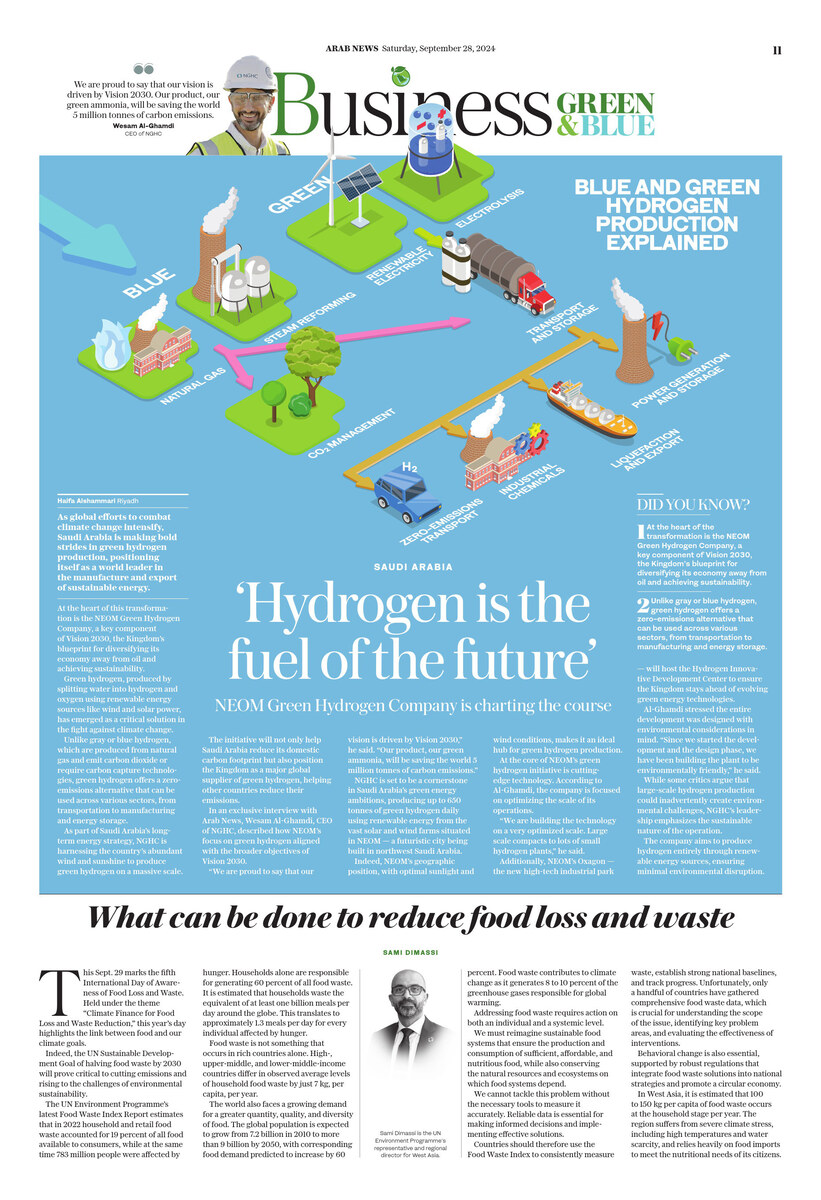What can be done about food waste?

https://arab.news/5yfg3
This Sept. 29 marks the fifth International Day of Awareness of Food Loss and Waste. Held under the theme “Climate Finance for Food Loss and Waste Reduction,” this year’s day highlights the link between food and our climate goals.
Indeed, the UN Sustainable Development Goal of halving food waste by 2030 will prove critical to cutting emissions and rising to the challenges of environmental sustainability.
The UN Environment Programme’s latest Food Waste Index Report estimates that in 2022 household and retail food waste accounted for 19 percent of all food available to consumers, while at the same time 783 million people were affected by hunger.
Households alone are responsible for generating 60 percent of all food waste. It is estimated that households waste the equivalent of at least one billion meals per day around the globe. This translates to approximately 1.3 meals per day for every individual affected by hunger.
Food waste is not something that occurs in rich countries alone. High-, upper-middle, and lower-middle-income countries differ in observed average levels of household food waste by just 7 kg, per capita, per year.
The world also faces a growing demand for a greater quantity, quality, and diversity of food. The global population is expected to grow from 7.2 billion in 2010 to more than 9 billion by 2050, with corresponding food demand predicted to increase by 60 percent.
Food waste contributes to climate change as it generates 8 to 10 percent of the greenhouse gases responsible for global warming.
Addressing food waste requires action on both an individual and a systemic level.
We must reimagine sustainable food systems that ensure the production and consumption of sufficient, affordable, and nutritious food, while also conserving the natural resources and ecosystems on which food systems depend.
We cannot tackle this problem without the necessary tools to measure it accurately. Reliable data is essential for making informed decisions and implementing effective solutions.
Countries should therefore use the Food Waste Index to consistently measure waste, establish strong national baselines, and track progress.
Unfortunately, only a handful of countries have gathered comprehensive food waste data, which is crucial for understanding the scope of the issue, identifying key problem areas, and evaluating the effectiveness of interventions.
Behavioral change is also essential, supported by robust regulations that integrate food waste solutions into national strategies and promote a circular economy.
It is of utmost importance that financing is secured to combat food waste in the global effort to meet the climate goals and advance the 2030 UN SDGs.
Sami Dimassi
In West Asia, it is estimated that 100 to 150 kg per capita of food waste occurs at the household stage per year. The region suffers from severe climate stress, including high temperatures and water scarcity, and relies heavily on food imports to meet the nutritional needs of its citizens.
Meanwhile, the region’s cultural diversity, varied diets and traditions often complicate food management, resulting in increased levels of waste.
Furthermore, weak infrastructure, especially for cool storage, coupled with armed conflicts, hamper efforts to mitigate food waste.
Higher seasonal temperatures, extreme heat events, and droughts make it more challenging to store, process, transport, and sell food safely, often leading to significant volumes being wasted.
As of 2022, only 21 countries have included food loss and waste reduction in their national climate plans.
The upcoming 2025 revision process of the Nationally Determined Contributions and the National Biodiversity Strategies and Action Plans are a key opportunity to raise climate ambition by integrating food loss and waste.
The UN Environment Programme has always played a crucial role in this regard, with successful campaigns such as the “Recipe of Change,” led by UNEP Regional Office for West Asia, which targets households, the hospitality industry, retail, and educational institutions.
During the month of Ramadan, in cooperation with the Hilton Hotels Chain, the campaign helped bring about a considerable reduction of food waste in hotel kitchens of 61 percent in 2023 and a further 21 percent in 2024, with a growing number of hotels joining the initiative.
We have proven that collective action can lead to substantial reductions in food waste.
Furthermore, we are committed to support the Global Cooling Pledge through working with our partners on implementing efficient cooling systems in the food supply chain, which can dramatically minimize waste.
As we mark the International Day of Awareness of Food Loss and Waste, we stress that it is of utmost importance that financing is secured to combat food waste in the global effort to meet the climate goals and advance the 2030 UN SDGs.
• Sami Dimassi is the UN Environment Programme’s representative and regional director for West Asia




























